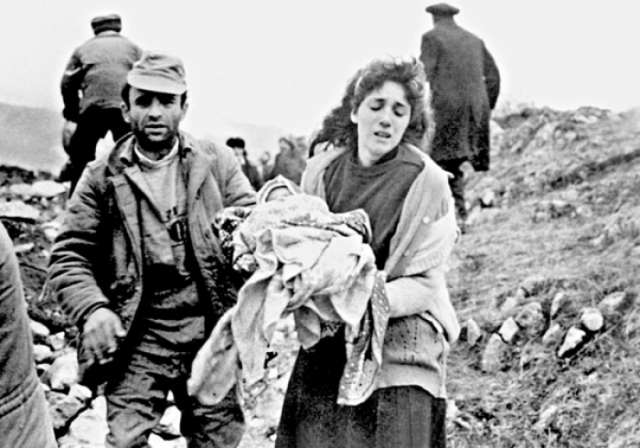I was 20 when our town Khojaly in Azerbaijan’s Nagorno-Karabakh region fell under Armenian siege, and Anar was only a boy of 8. We both grew up in close knit families, and we both lost many relatives on that ruthless night on February 25-26, when Armenian soldiers invaded our town and murdered indiscriminately. We both ran into the night, through the forest, and into the killing field, as bullets sprayed in all directions. Anar was moved from his basement shelter, from town to town, relocating at the pace of the increasing invasions. I was captured and sent to an Armenian torture camp, where I endured and witnessed unspeakable depravities, violence and cruelty. We both managed to survive, while 613 unarmed Azerbaijani men, women, children and the elderly from our small town did not.
Considering our own tragic experiences of enduring and surviving the Khojaly Massacre, the piece by Mr. Atamian and Mr. Nahapetyan is an attack on our humanity, on the deepest parts of our hearts, our trauma and our memories. It revises a documented and proven tragedy into something political and frivolous. It is, in no uncertain terms, a piece written to deny crimes against humanity. Even the current President of Armenia, Serzh Sargsyan, has admitted what happened in Khojaly, stating “Before Khojaly, the Azerbaijanis thought that they were joking with us; they thought that the Armenians were people that could not raise their hand against the civilian population. We were able to break that stereotype. And that’s what happened”.
Today, I am a mother living in Baku, and Anar is attempting to build his own business in California. We are each in our own way scarred for life, inside and out, and moving forward as best as we can, with hopes for a better future. As Elie Wiesel famously said about his own experience in the Holocaust, “For the dead and the living, we must bear witness.” Anar and I both reached out to Huffington Post to share our side of the story, but we were greeted with silence.
But reading the editorial hurt more than Anar and I; it is also an assault on the basic tenets of truth and a distortion of more than history. It attacks a current reality that is very important in our day and time. In 2015, a synagogue in the heart of Los Angeles hosted a memorial for the victims of Khojaly, and since then our dear friends from the Jewish community have continued to share in our memorial each year.
The Human Rights Watch has called the Khojaly Massacre “the largest massacre in the conflict” between Armenia and Azerbaijan, placing direct responsibility for the massacre of civilians with the Armenian forces. The European Court of Human Rights has also confirmed the facts about Khojaly in its ruling from 2010, and over 10 countries have officially recognized the massacre. The United Nations Security Council has passed four resolutions condemning the illegal occupation and ethnic cleansing of the entire Karabakh region of Azerbaijan.
To deny the Khojaly Massacre is evil, and to allow political and special interests to create falsehoods and spread such hate and distrust is something that we must stand up against. Never has remembrance of the cruelty of the past been more important and never has the need for friendship and hope for peace been so great.
Durdane Aghayeva is a Muslim woman from Azerbaijan with a special connection to Jewish communities across the world, particularly here in Los Angeles. Durdane is a survivor of torture and a passionate advocate for peace. She works tirelessly for the empowerment of all survivors, to help others to find strength and healing through the unifying process of sharing.
/JewsJournal.com/
More about: #Khojalygenocide
















































